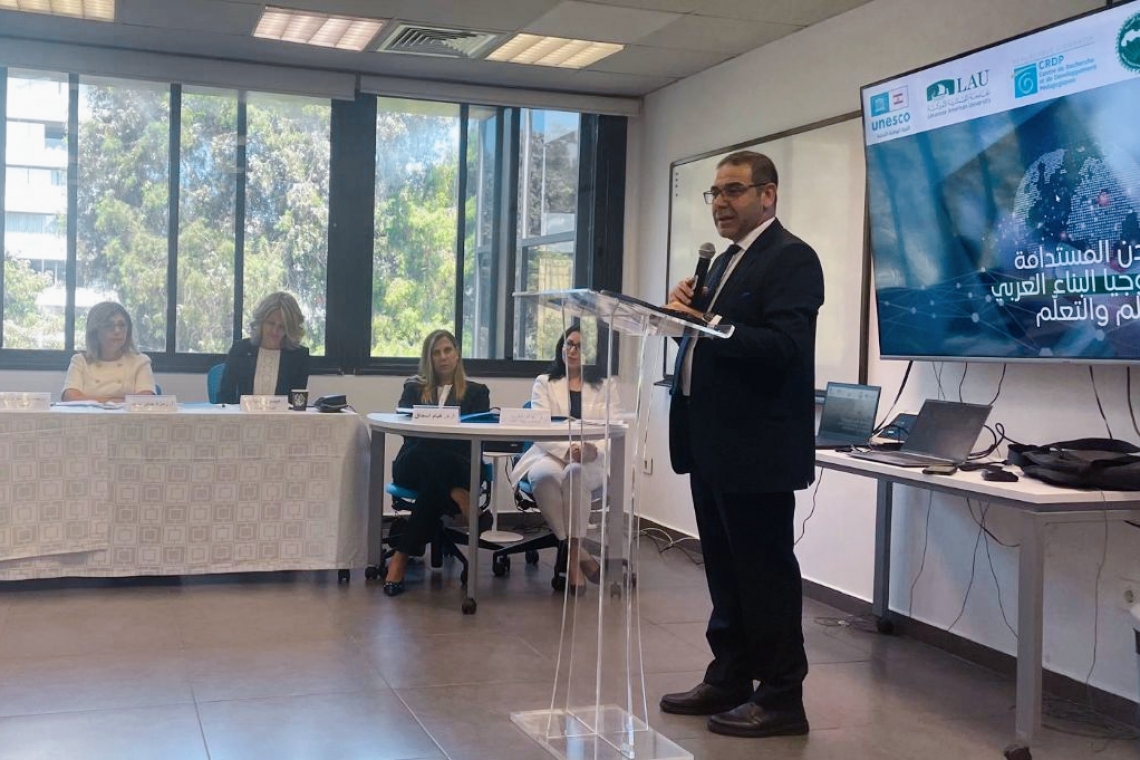As part of its efforts to promote the concepts of sustainable development in architectural design, urban planning, and education, the Department of Science and Scientific Research at ALECSO organized, in collaboration with the UNESCO Office in Beirut, the Lebanese American University (LAU), and the Lebanese National Commission for Education, Science and Culture, a regional forum entitled: “Smart and Sustainable Cities and Traditional Arab Building Technology.” The event took place on July 30–31, 2025, at the LAU campus in Beirut.
The Forum targeted a broad audience, including students, academics, experts in sustainable architecture, as well as representatives from relevant ministries and civil society. It highlighted the role of traditional Arab architecture in achieving sustainability, and emphasized the importance of integrating artificial intelligence and digital tools in promoting sustainable development and building smart and sustainable cities.
In his opening remarks, Dr. Mohamed Sanad Abou Darwish conveyed the greetings of H.E. Dr. Mohamed Ould Amar, Director-General of ALECSO, to all participants. He noted that the implementation of this scientific event aligns with the goals set out in the Arab Strategy for Scientific Research, Technology, and Innovation. This Strategy, he added, seeks to link scientific research with socio-economic development, foster partnerships, and promote the sharing of expertise among Arab and international stakeholders. He indicated that ALECSO’s approach to “smart and sustainable cities” combines modern technology, innovation, and the heritage of traditional Arab architecture.
Ms. Ramza Jaber Saad, Deputy Secretary-General of the Lebanese National Commission, welcomed the constructive collaboration between ALECSO, the Lebanese National Commission, and the UNESCO Beirut Office. She underlined the need to re-think the concept of “the city” in light of current environmental, social, and economic challenges. She stressed that smart and sustainable cities must place the human being at the core of their priorities, and harness technology to achieve justice and inclusiveness. She also highlighted the central role of education in shaping future cities, calling for lifelong learning, citizenship, and sustainable development to become integral components of urban planning.
Dr. Maysoun Chehab, representative of the UNESCO Beirut Office, commended ALECSO’s efforts in organizing the Forum, jointly with the Lebanese National Commission and LAU. She emphasized the importance of collaboration among national and international academic institutions in building knowledge-based and inclusive cities. She noted that smart cities are not only built through infrastructure but also by embedding education into urban planning. She referred, in this regard, to Lebanon's digital transformation in education strategy, highlighting the role of youth in driving change and the importance of lifelong learning in tackling climate and digital challenges and building more just and sustainable cities.
The Forum’s program involved scientific sessions and interactive workshops that discussed the links between SDG 4 (Quality Education) and SDG 11 (Sustainable Cities and Communities). It also featured practical training on developing a roadmap to transform an existing city into a sustainable one, with active youth participation.
The Forum concluded with the presentation of actionable recommendations designed to formulate a shared Arab vision for best practices in the governance of smart and sustainable cities. Proposals were also made to develop university curricula with a view to guiding students toward this field.



